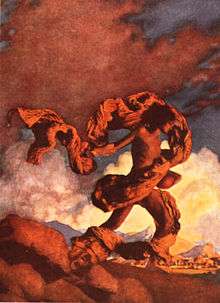Amphion and Zethus


Amphion /ˈæmfiən/ (Ancient Greek: Ἀμφίων) and Zethus /ˈziːθəs/ (Ζῆθος, Zēthos) were, in ancient Greek mythology, the twin sons of Zeus by Antiope. They are important characters in one of the two founding myths of the city of Thebes, because they constructed the city's walls.
Childhood
Amphion and Zethus were the sons of Antiope, who fled in shame to Sicyon after Zeus raped her, and married King Epopeus there. However, either Nycteus or Lycus attacked Sicyon in order to carry her back to Thebes and punish her. On the way back, she gave birth to the twins and was forced to expose them on Mount Cithaeron. Lycus gave her to his wife, Dirce, who treated her very cruelly for many years.[1]
Antiope eventually escaped and found her sons living near Mount Cithaeron. After they were convinced that she was their mother, they killed Dirce by tying her to the horns of a bull, gathered an army, and conquered Thebes, becoming its joint rulers.[1]
Rule of Thebes
Amphion became a great singer and musician after Hermes taught him to play and gave him a golden lyre. Zethus became a hunter and herdsman, with a great interest in cattle breeding. They built the walls around the Cadmea, the citadel of Thebes. While Zethus struggled to carry his stones, Amphion played his lyre and his stones followed after him and gently glided into place.[2]
Amphion married Niobe, the daughter of Tantalus, the Lydian king. Because of this, he learned to play his lyre in the Lydian mode and added three strings to it.[3] Zethus married Thebe, after whom the city of Thebes was named.
Later misfortunes
Amphion's wife Niobe had many children, but had become arrogant and because of this she insulted the goddess Leto, who had only two children, Artemis and Apollo. Leto's children killed Niobe's children in retaliation (see Niobe). In Ovid, Amphion commits suicide out of grief; according to Telesilla, Artemis and Apollo murder him along with his children. Hyginus, however, writes that in his madness he tried to attack the temple of Apollo, and was killed by the god's arrows.[4]
Zethus had only one son, who died through a mistake of his mother Thebe, causing Zethus to kill himself.[2] In the Odyssey, however, Zethus's wife is called a daughter of Pandareus in book 19, who killed her son Itylos in a fit of madness and became a nightingale.[5]
After the deaths of Amphion and Zethus, Laius returned to Thebes and became king.
Compare with Castor and Polydeuces (the Dioscuri) of Greece, and with Romulus and Remus of Rome.
See also
References
| Wikimedia Commons has media related to Amphion and Zethus. |
- 1 2 Apollodorus, Library, 3.5.5
- 1 2 Tripp, Edward. Crowell's Handbook of Classical Mythology. New York: Thomas Crowell Company, 1970, p. 44. Original, less elaborate, account in Pausanias Description of Greece, 6.20.18
- ↑ Tripp, Edward. Crowell's Handbook of Classical Mythology. New York: Thomas Crowell Company, 1970, p. 43
- ↑ Gantz, Timothy. Early Greek Myth. Baltimore: Johns Hopkins University Press, 1993, p. 539
- ↑ Homer. The Odyssey. Trans. Richmond Lattimore. New York: Harper Collins, 1967, p. 295
Sources
 This article incorporates text from a publication now in the public domain: Chisholm, Hugh, ed. (1911). "Amphion and Zethus". Encyclopædia Britannica (11th ed.). Cambridge University Press.
This article incorporates text from a publication now in the public domain: Chisholm, Hugh, ed. (1911). "Amphion and Zethus". Encyclopædia Britannica (11th ed.). Cambridge University Press.
| Regnal titles | ||
|---|---|---|
| Preceded by Lycus |
Mythical Kings of Thebes (jointly) |
Succeeded by Laius |
